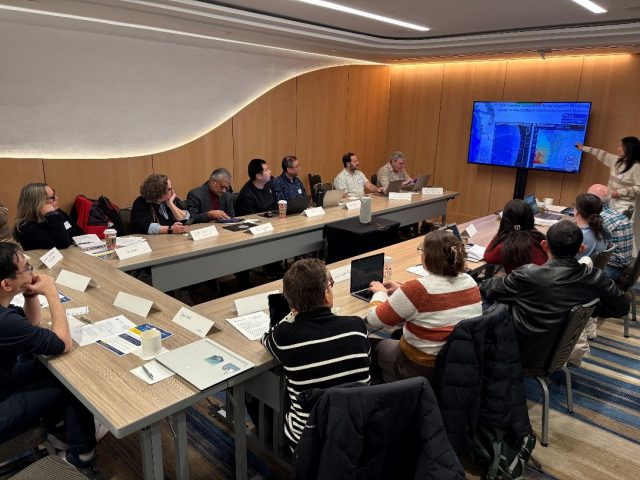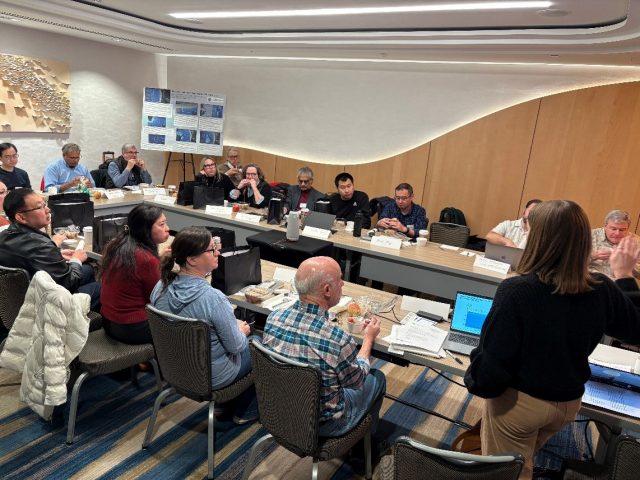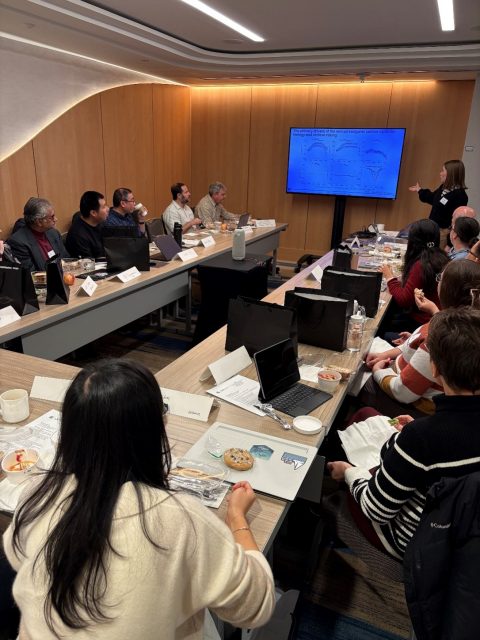Advancing Ocean Carbon Science: Highlights from OOI’s SUGR Meeting on Data Quality and Best Practices
On Sunday, December 8th, the Ocean Observatories Initiative (OOI) hosted its first Scientific User Group for Research (SUGR) meeting in Washington, D.C., prior to the AGU Fall Meeting. Held at The Westin DC Downtown, the event brought together researchers, scientists, and members of the user community to discuss the critical role of OOI data in advancing our understanding of the Carbon Cycle.
Exploring Ten Years of Insights and Innovation
The SUGR meeting provided a platform to review a decade of advancements in ocean carbon science supported by OOI data. Key presentations included:
- Ten Years of pCO₂ and pH Measurements on the NSF OOI Regional Cabled and Endurance Arrays: Techniques, Validation, and Science Opportunities presented by Ed Dever, Wendi Ruef, and Chris Wingard (OOI/OSU), highlighted the data generated by the Regional Cabled Array and Endurance Array. This dataset, including ten years of hourly pH and pCO₂ measurements, revealed significant variability and highlighted the potential for long-term monitoring to advance our understanding of ocean carbon processes.
- Using OOI Data to Investigate Carbon Cycling in the Irminger Sea, presented by Meg Yoder (Boston College), explored the unique challenges and opportunities associated with studying carbon cycling in the North Atlantic, leveraging OOI data for cutting edge research in this remote and dynamic region.
- OOI Biogeochemical Working Group & Data User Guide and 7 Reasons Why You Need It! presented by Merrie Beth Neely (Global Science & Technology), emphasized the value of the Biogeochemical Data User Guide and how it supports researchers in navigating and utilizing OOI’s vast datasets effectively.
- The Pioneer MAB Array: Location and Sensors, presented by Al Plueddemann (OOI/WHOI), provided an overview of the Pioneer Array’s configuration and sensor capabilities, highlighting its role in enhancing our understanding of shelf dynamics and biogeochemical processes.
- RCA Instrument Refresh, presented by Mike Vardaro (OOI/UW), focused on recent upgrades to the Regional Cabled Array’s instrumentation, ensuring its continued functionality for supporting new oceanographic research.
- NOAA Ocean Acidification and OOI Data, presented by Liza Wright-Fairbanks (NOAA OAP), highlighted the integration of OOI data with NOAA’s efforts to monitor and address ocean acidification.
The meeting fostered a collaborative atmosphere, with attendees sharing insights and identifying opportunities to enhance the value of OOI data. The discussions extended to updating the GOOS-Endorsed Best Practices document and exploring ways to integrate OOI datasets more seamlessly with other oceanographic networks.
Session Highlights and Key Takeaways
- Innovative Tools and Techniques: The discussions touched on the importance of deploying advanced tools to maximize the impact of OOI data. High-resolution pH and DIC sensors, microbial fuel cells for renewable energy and CO₂ fixation, and imaging flow cytometers were highlighted as transformative technologies for biogeochemical research.
- Data Quality and Calibration: Speakers emphasized the critical need for rigorous data validation and quality control processes. Challenges such as fouling and sensor drift were addressed, with proposed solutions including the development of improved calibration standards and updated best practices manuals.
- Expanding Community Engagement: Participants stressed the importance of user-driven collaboration in refining tools like the Biogeochemical Sensor Data Best Practices & User Guide. Suggestions included organizing science-themed webinars, leveraging existing resources, and enhancing tutorial accessibility to better support the community.
Future Plans
As OOI continues to evolve, SUGR meetings will remain central to addressing challenges, exploring innovations, and driving impactful research.
We welcome your suggestions for future SUGR meeting topics and areas of focus. Your input is critical in shaping OOI’s future efforts. Lastly, the OOI looks forward to working with you, our biogeochemical data champions, to continue to improve best practices for BGC research.
For more information and access to post-event resources, visit the SUGR Ocean Carbon Science webpage.

OOI SUGR Meeting, Dec 8th, Washington, DC

Meg Yoder, Boston College

